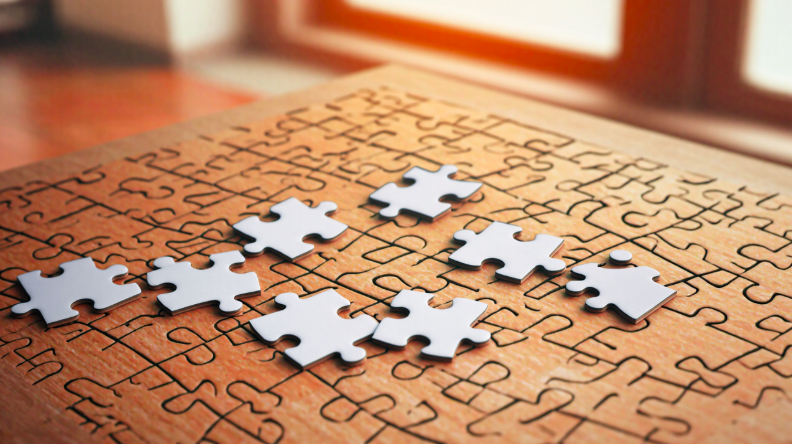Can Puzzles Delay Dementia Symptoms? Here's What Research Shows
Explore how puzzles may help delay dementia symptoms by engaging the brain. Learn about the cognitive benefits of jigsaw puzzles, crosswords, and more.
Apr 03, 2025247 Shares14.5K Views

Puzzles and dementia share an interesting connection that has sparked growing interest in the research community. Many studies have suggested that puzzles, particularly those that involve problem-solving and memory, may help delay or reduce the symptoms of dementia. Engaging in activities like jigsaw puzzles, crossword puzzles, and Sudokucan stimulate the brain, promoting cognitive health. In fact, daily puzzles for cognitive healthare being recommended as a simple yet effective strategy for maintaining mental sharpness and preventing cognitive decline.
The idea behind this is that puzzles challenge the brain, keeping it active and engaged. This mental exercise may help slow down cognitive decline and improve memory, focus, and concentration. Regular puzzle-solving has been linked to maintaining brain function, as it encourages neural connections and brain plasticity, which are important for overall cognitive well-being.
While puzzles are great for adults, they can also benefit children. In fact, experts suggest that the best age for kids to start puzzlesis around 2-3 years old, as this is when they begin to develop problem-solving skills. Starting puzzles early can help lay the foundation for cognitive development and provide long-term benefits for brain health.
Current research on this topic shows promising results. For example, studies indicate that individuals who engage in mental exercises, such as puzzles, may experience slower cognitive decline compared to those who do not. However, more research is needed to fully understand how puzzles may influence dementia development and progression. Despite this, puzzles are increasingly recognized as an accessible, enjoyable way to support brain health.
Cognitive Benefits Of Puzzles
Enhancing Cognitive Reserve
Puzzles are a powerful tool in building cognitive reserve, which refers to the brain's ability to withstand damage and continue functioning well. Engaging in puzzle-solving activities helps strengthen neural connections, making the brain more adaptable and better able to handle cognitive stress. This can be particularly important in delaying the onset of cognitive decline associated with conditions like dementia.
Improving Memory
One of the main cognitive benefits of puzzles is their ability to improve memory. Activities like crosswords and jigsaw puzzles require users to recall information, strengthen their ability to retain and access memories. Studies have shown that individuals who regularly engage in these types of puzzles tend to perform better in memory-related tasks. For example, research published in The Journals of Gerontologyfound that people who solve puzzles frequently show better memory performance and have a lower risk of memory decline as they age.
Enhancing Problem-Solving Skills
Puzzles are excellent for sharpening problem-solving skills. They require individuals to think critically and use logic to arrive at solutions. Whether it's completing a complex jigsaw puzzle or filling in the blanks of a crossword, these activities challenge the brain to think creatively and strategically. A study from the Journal of Aging and Healthhighlighted that regularly engaging in puzzles can improve overall cognitive function, particularly in areas that involve executive functions like planning and decision-making.
Specific Types of Puzzles and Their Effects
Different types of puzzles offer specific cognitive benefits. For example:
- Crossword Puzzles:These puzzles are particularly effective at improving verbal memory, as they require recall of words and associations. They also help with language skills and expand vocabulary.
- Jigsaw Puzzles:Jigsaw puzzles are great for enhancing visual-spatial skills. They involve recognizing patterns, thinking about the relationships between pieces, and putting them together, which engages the brain's ability to process visual information and improve memory retention.
Research Findings On Puzzles And Dementia
Delaying Dementia Symptoms
Research has shown that engaging in puzzles can help delay the onset of dementia symptoms. A key study in this area is the Bronx Aging Study, which found that elderly individuals who regularly engaged in mental activities like puzzles had a lower risk of developing dementia. The study suggested that these activities helped maintain cognitive function and could even delay the progression of Alzheimer's disease.
The research indicated that individuals who spent time on stimulating activities, including solving puzzles, showed slower cognitive decline compared to those who engaged in fewer cognitive activities. The findings suggest that mental exercises may contribute to maintaining brain health for longer periods, potentially delaying dementia symptoms by years.
Other Activities That Contribute to Reduced Dementia Risk
While puzzles are beneficial, other cognitive activities also play a significant role in reducing dementia risk. Studies have found that activities such as playing card games, chess, or engaging in complex tasks like reading and learning new skills can also help maintain cognitive health. These activities challenge the brain in various ways, helping to build cognitive reserve and improve memory, focus, and problem-solving abilities.
Research has consistently shown that people who engage in regular mental stimulation are better able to cope with the effects of aging and are less likely to experience severe cognitive decline. For example, a study published in Neurologyfound that people who played chess or engaged in other strategy-based games had a lower risk of developing dementia symptoms later in life. These activities help strengthen the brain’s cognitive networks, supporting long-term brain health.
Types Of Puzzles For Cognitive Health
Crossword Puzzles
Crossword puzzles are excellent for improving verbal memory and language skills. These puzzles require participants to recall words, associations, and use critical thinking to fill in the blanks. They are particularly beneficial for stimulating brain areas involved in language and verbal processing. As dementia progresses, crossword puzzles can be adapted by reducing complexity or offering clues to make the puzzles more manageable, ensuring that individuals remain engaged without feeling frustrated.
Jigsaw Puzzles
Jigsaw puzzles are particularly helpful for improving visual-spatial skills and memory. These puzzles challenge individuals to recognize patterns and shapes, which helps maintain cognitive function. They can be adapted for individuals at different stages of dementia by adjusting the size and complexity of the puzzle pieces. For those in earlier stages of dementia, using simpler puzzles with larger pieces can provide an enjoyable challenge. As the disease progresses, puzzles with fewer pieces or themes that are familiar can help maintain interest and stimulate the mind.
Card Games
Card games, such as memory card games, solitaire, or bridge, are excellent tools for enhancing concentration, memory, and strategic thinking. They engage the brain in decision-making and improve memory recall. For individuals in the early stages of dementia, traditional card games like poker or bridge can provide a good cognitive workout. As dementia progresses, simpler card games, like matching pairs or memory-based games, can be used to maintain engagement and mental stimulation while minimizing frustration.
Adapting Puzzles for Different Stages of Dementia
At different stages of dementia, the level of puzzle difficulty should be adjusted to ensure that the puzzles remain engaging and challenging. In the early stages, more complex puzzles like crosswords or larger jigsaw puzzles may be appropriate, as they provide a higher level of cognitive engagement. As dementia advances, reducing the complexity of puzzles is important to maintain a sense of accomplishment and enjoyment. This can include using puzzles with fewer pieces, offering visual clues, or using games that focus on recall and pattern recognition.
Implementing Puzzle Activities In Daily Life
Incorporating Puzzles into Daily Routines
To maximize the cognitive benefits of puzzles, it's important to make them a regular part of daily life. Setting aside time each day to work on a puzzle, whether it’s a crossword, jigsaw, or card game, helps keep the brain active. You can start by dedicating 15-30 minutes each day to a puzzle, gradually increasing the time as needed. By integrating puzzle activities into daily routines, individuals can maintain consistent mental stimulation, which is key for preserving cognitive function.
Consistency in Puzzle Activities
Consistency is essential for cognitive health. Just like physical exercise helps maintain physical fitness, daily mental exercise through puzzles helps preserve cognitive abilities. Consistent engagement with puzzles promotes neural connections and enhances cognitive reserve, which can delay cognitive decline. Aim to include a variety of puzzle types in your routine, such as crosswords, Sudoku, jigsaw puzzles, and memory games, to engage different areas of the brain and keep the activities interesting.
Variety in Puzzle Activities
Variety is crucial when incorporating puzzles into daily life. Different puzzles challenge the brain in unique ways, targeting memory, problem-solving, and visual-spatial skills. For example, switching between crossword puzzles, jigsaw puzzles, and card games can provide a broader cognitive workout. This variety not only keeps the activities stimulating but also prevents the brain from becoming too accustomed to one type of challenge, ensuring continued cognitive growth.
Making Puzzle Activities Enjoyable and Social
Puzzles don’t have to be a solitary activity. Turning puzzle-solving into a social event can make it more enjoyable. Family members or friends can join in on jigsaw puzzles or card games, which promotes interaction and helps create meaningful social connections. For those with dementia, involving caregivers or family in these activities can be both a therapeutic and bonding experience. Additionally, joining puzzle clubs or participating in online puzzle communities can provide a social outlet while keeping the activity engaging.
FAQs
Can Puzzles Completely Prevent Dementia?
Puzzles alone cannot completely prevent dementia. While they offer cognitive benefits and may delay the onset of symptoms, dementia is influenced by many factors, including genetics and overall brain health. Engaging in puzzles, however, can contribute to maintaining cognitive function and reducing the risk of dementia-related decline, but it should be part of a broader healthy lifestyle that includes physical activity, social engagement, and a balanced diet.
What Types Of Puzzles Are Most Effective For Cognitive Health?
Different types of puzzles can target various cognitive functions. Crossword puzzles are excellent for improving memory and verbal skills, while jigsaw puzzles help with visual-spatial skills. Sudoku and other logic puzzles enhance problem-solving abilities. Card games, such as memory games, can help with concentration and recall. Engaging in a mix of these puzzles is ideal for promoting overall cognitive health.
How Often Should Puzzles Be Done To See Benefits?
To see cognitive benefits, puzzles should be done regularly, ideally daily or several times a week. Consistency is key for maintaining brain activity. Even short sessions of 15-30 minutes can provide positive results over time. The more frequently you engage in mentally stimulating activities like puzzles, the greater the long-term impact on cognitive function.
Do Puzzles Help With Other Cognitive Functions Besides Memory?
Yes, puzzles can help improve various cognitive functions besides memory. They enhance problem-solving skills, attention span, concentration, and visual-spatial abilities. Engaging in puzzles can also stimulate critical thinking and logical reasoning, which are essential for overall brain health. These benefits contribute to maintaining cognitive flexibility and mental sharpness, particularly as we age.
Can Puzzles Be Used As A Tool For Early Dementia Diagnosis?
While puzzles can be a useful tool for detecting early signs of cognitive decline, they are not definitive for diagnosing dementia. Difficulty with puzzle-solving, especially in tasks that were previously easy, can be a warning sign of cognitive issues. However, an official diagnosis of dementia requires clinical evaluation and tests conducted by healthcare professionals. Puzzles can serve as an early indicator of potential cognitive problems but should be used alongside other diagnostic methods.
Latest Articles
Popular Articles
